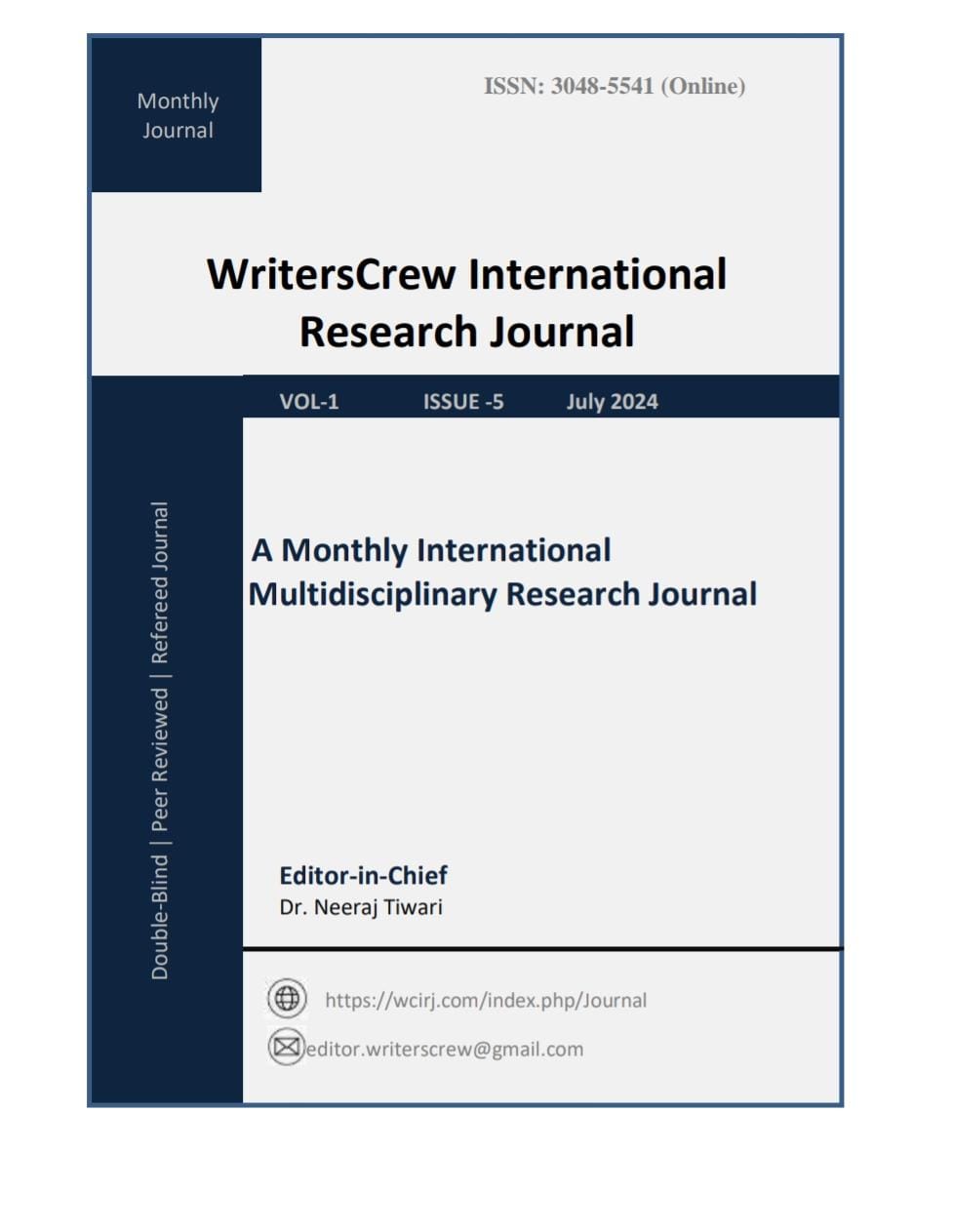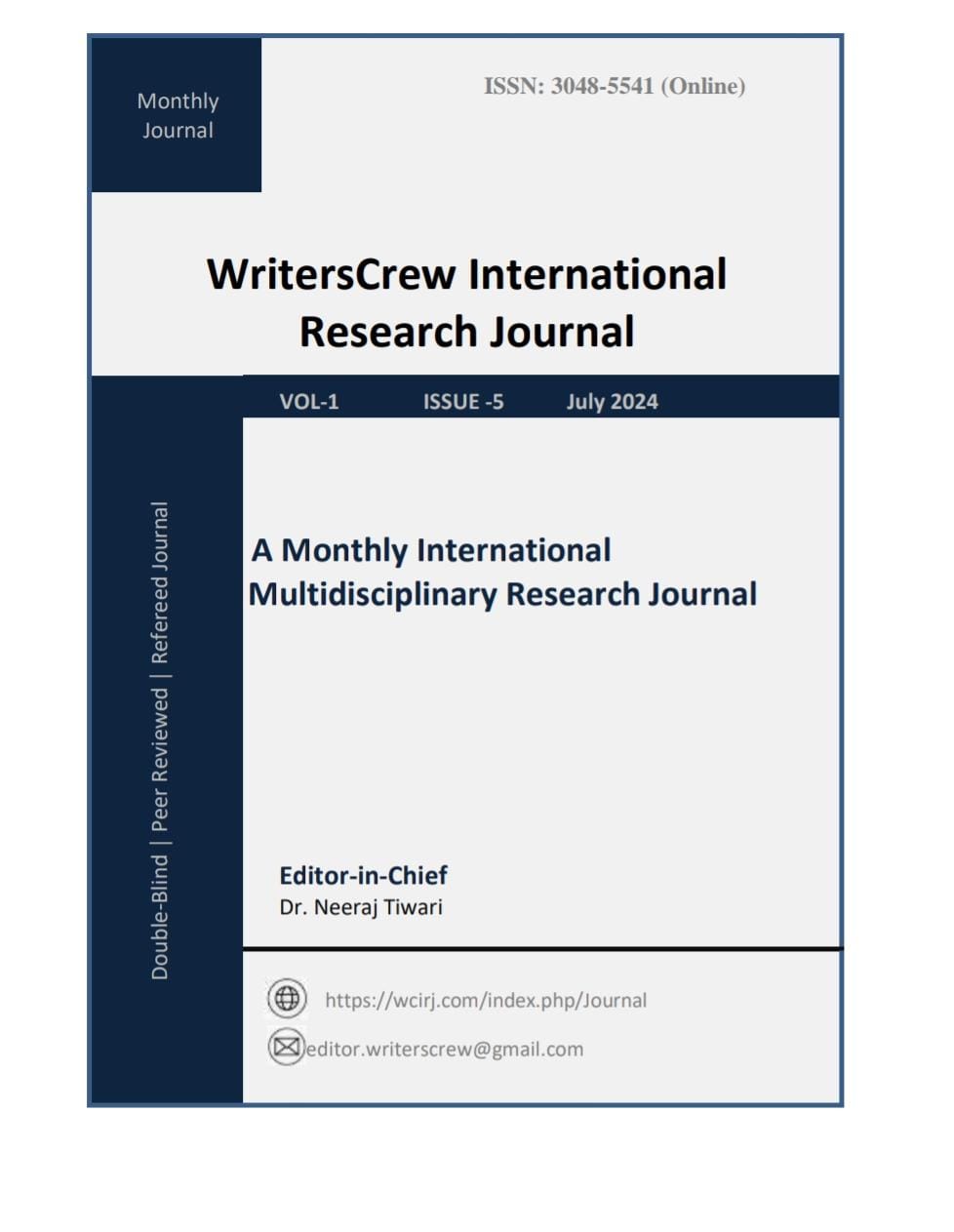Archives - Page 2
-

Expanded Change Management Strategies In Organizations: Key Approaches and Best Practices
Vol. 1 No. / ISSUE 6, Page 262 - 266, AUG (2024)This paper provides a comprehensive examination of change management strategies, focusing on approaches that facilitate smoother transitions in organizational environments. With evolving challenges in global markets, organizational change has become integral to business survival and competitiveness. This paper explores popular and effective change management models, such as Kotter’s 8 -Step Process and Lewin's Change Management Model, discusses the role of leadership, communication, and technology in managing organizational change effectively.
-

PHYSIOTHERAPY- SPORTS INJURY PREVENTION STRATEGIES: ANALYZING THE EFFECTIVENESS OF SPECIFIC WARM-UP ROUTINES AND CONDITIONING PROGRAMS
Vol. 1 No. / ISSUE 5, Page 186 - 215, JULY (2024)The present study concentrates on representing the importance of a number of strategies for the reduction of the possibilities related to sports-based wounds. “Warming-up” and “conditioning programs” are two of the most essential ways that should be considered by players in the field to increase their energy and power during games. In this study, “interpretivism research philosophy”, and “inductive research approach” are followed in order to develop a detailed understanding of the study. Here, secondary data is gathered by the researcher from authentic websites, and journals published from 2020. A thematic interpretation of certain themes related to the topic provides an explicit notion of the present context.
The examination of data is based on the secondary data and the secondary data has dynamic information about the prevention of the injuries and the importance of the prevention of the injuries. The sportsmen’s career and other factors such as diet and fitness have been discussed. In the strategy part, various training and fitness planning have been explained for the study. the present analysis of the data has revealed that lack of fitness is the main reason for the injuries and the warm-up routines and conditioning programs have their importance to mould the fitness of a player. Players should drink adequate water to stay hydrated, and these individuals should take proper rest to avoid tiredness during sports activities.
-

LEADERSHIP STYLES AND EMPLOYEE MOTIVATION: ANALYZING THE IMPACT ON ENGAGEMENT AND PRODUCTIVITY
Vol. 1 No. / ISSUE 5, Page 182 - 186, JULY (2024)This research paper examines how various leadership styles impact employee motivation, engagement, and productivity. In a dynamic work environment, leadership approach significantly influences how employees perceive their work and contribute to organizational success. This paper analyzes the effects of autocratic, democratic, transformational, and laissez-faire leadership styles, drawing on case studies and survey data. The findings reveal that while transformational leadership is most associated with high engagement, the effectiveness of leadership styles can vary depending on organizational context.
-

IMPACT OF REMOTE WORK ON TEAM DYNAMICS: EXPLORING HOW REMOTE WORK INFLUENCES COLLABORATION, COMMUNICATION, AND TEAM COHESION
Vol. 1 No. / ISSUE 5, Page 177 - 181, JUNE (2024)This paper explores the multifaceted impact of remote work on team dynamics, focusing on collaboration, communication, and team cohesion. The move towards remote work,
catalyzed by the COVID-19 pandemic and advancements in digital technology, has redefined how teams interact. While remote work offers increased flexibility and productivity, it also presents challenges in maintaining efficient communication and a sense of team unity. This paper draws on recent studies, surveys, and qualitative interviews to assess the implications of remote work on team functionality and proposes strategies for maintaining strong team dynamics in a virtual environment. Figures and charts are used to illustrate communication patterns and team cohesion metrics in remote setups. -

SOCIOLOGY CULTURAL ASSIMILATION VS. MULTICULTURALISM: EXAMINE THE EFFECTS OF CULTURAL ASSIMILATION ON IMMIGRANT COMMUNITIES COMPARED TO MULTICULTURAL POLICIES
Vol. 1 No. / ISSUE 5, Page 151 - 176, JULY (2024)For the immigrant community migrating into a different country, it is important for them to adopt the cultural trends and values of that country. This can be done effectively with the help of cultural assimilation and multiculturalism. Cultural assimilation tends to create significant impact in comparison multiculturalism. This impact can be seen both in positive and negative way. This research study aims to explore such impact created on the immigrant community. The research study begins with the introductory chapter, which outlines the background of the study, aims and objectives and the research questions. The study is significant owing to the challenges that the immigrant community face in the new host country. The literature review aims to outline the relevant literature works on the topics of research study such as cultural assimilation, multi culturalism and the situation of the immigrant community. Relationship with an existing theory namely the multiculturalism theory and the variables of the research have been established.
The suitable methodology has been chosen for the study and the interpretivism philosophy and the inductive approach has been followed for the study. Secondary data has been collected and the thematic data analysis has been done. The various factors and issues with the multiculturalism and assimilation of culture have been discussed. Simultaneously the examples and the statistics have been incorporated in the data examination. The concluding section outlines some strategic recommendations on the implementation of cultural assimilation. This can be implemented based on the concept of socialization and enhancing the belongingness in the society.
-

PHYSIOTHERAPY FOR NEUROLOGICAL CONDITIONS: EVALUATING DIFFERENT APPROACHES FOR MANAGING STROKE OR PARKINSON'S DISEASE PATIENTS.
Vol. 1 No. / ISSUE 5, Page 127 - 150, JULY (2024)The purpose of the study is to explore the importance of physiotherapy in the In the literature review the severity of PD and the effect on health. has been highlighted in a proper way as the cogitative declination can create a massive issue in the health factor of the patient. In the methodology chapter “interpretivism research philosophy” and “secondary data collection method” has been mentioned as it is appropriate for the study. Other than that, thematic analysis has been followed in the data analysis process along with the “systematic table”. In the findings chapter, themes have been discussed based on the topic such as the purpose of strategies, the importance of physiotherapy, and new approaches for PD. In conclusion, some limitations of the study like limited time, and recommendations like early intervention have been discussed
-

SHAKESPEARE AND HARIVANSH RAI BACHCHAN
Vol. 1 No. / ISSUE 4, Page 99 - 126, JUNE (2024)This study explores the comparative literary analysis of William Shakespeare and Harivansh Rai Bachchan, focusing on stylistic approaches, cultural contexts and thematic differences. Shakespeare, the English playwright, delves the external conflicts, human flaws and societal power struggles through ambition and tragedy, and Bachchan, an iconic Indian poet, underscores the philosophical introspection, existential questions and spiritualism in works, mainly in Madhushala. The study highlights the respective cultural context, post-colonial Indian and Renaissance England-shaped literacy output. The research uncovers the parallel dynamic of two literacy giants to offer insight into the universal themes of historical boundaries and transcend culture.
-

D L ROY AND JAISHANKAR PRASAD
Vol. 1 No. / ISSUE 4, Page 71 - 98, JUNE (2024)The study based on the comparison of the two authors DL Roy and Jaishankar Prasad has its relevance to the literature world and the research has explored that the two literary figures have the social influence and the influence of Shakespeare. Secondary data has been collected for the study and the examination of data has evaluated that the writers have reflected the British society and its issues and position of women and inspired the patriotism.
-

THE ROLE OF RESEARCH AND INNOVATION IN SHAPING THE NEW EDUCATION POLICY
Vol. 1 No. / ISSUE 4, Page 65 - 70, JUNE (2024)This paper aims to discuss the research and innovations that have led to the development of the new education policy. It stresses that empirical findings and progressive ideas matter in developing policies that respond to the contemporary challenges of learning institutions. Although the importance of research and innovation is undisputed, there are concerns regarding their overall influence on policymaking.Indication of Methodology:These gaps are presented in the following sections, which help by analyzing current practices, summarizing significant findings, and recommending further studies on incorporating research and innovation into education policies.Main Finding:The proposal's elements are a literature review, methodology, results, discussion, and conclusion, which give a comprehensive overview of how research innovations can impact education policies.Principal Conclusion:This study is important for the policymakers, educators and stakeholders; they need to provide proper strategies to improve the educational prospects and meet the requirements of the society.
-

SHAKESPEARE AND JAISHANKAR
Vol. 1 No. / ISSUE 4, Page 38 - 65, JUNE (2024)William Shakespeare and Jaishankar Prasad are two popular writers who have made significant contributions in the field of literature. The former writer has made contribution in English literature and latter has made contributions in Hindi literature. Based on the contributions made by them in the field of literature, a comparative analysis has been presented in this study. The study begins with the introductory chapter where the background behind conducting the study has been outlined. Both the writers have made significant contributions in the field of literature. The only difference lies in the language. Literature Review section outlines the literature works based on the topic of research. The literature works on William Shakespeare and Jaishankar Prasad have been explored and outlined. Post Colonial theory has been outlined. Interpretivism research philosophy with deductive research approach has been applied over here. Qualitative secondary data has been collected and thematic analysis of the same has been done. The findings have been obtained by exploring various relevant journal articles.
-

VITAMIN C: ANTIOXIDANT PROPERTIES AND IMMUNE SUPPORT, VITAMIN E: ANTIOXIDANT DEFENSE AND SKIN HEALTH
Vol. 1 No. / ISSUE 4, Page 28 - 37, JUNE (2024)Vitamin C and Vitamin E are further discussed in the paper with rest taken forward and define their health benefits, primarily as antioxidants. We see earlier that Vitamin C helps in immune system functions as well as teeth functioning while Vitamin E toxin retrieves services skin in healing and defends against free radicals. The review is based on all of the latest data related to these vitamins, including their combination with fluoride ions, food supplements, and innovative progressive technologies. It also examines how vitamins can be measured utilizing new methods such as vibrational spectroscopy and biosensors. Vitamin C and Vitamin E are two important vitamins for the wellbeing of humans and have many possibilities in every aspect including therapeutic devices and diagnostic as well investigative techniques.
-

Research paper - Shakespeare and D L Roy
Vol. 1 No. / Issue 4, Page: 1 - 27, June (2024)The influence of Shakespeare can be noticed in several creation of many Indian writers of the 16thcentury among these Dwijendralal Roy has greatly been influenced by Willam Shakespeare as Shakespearehas portrayed many aspects related to society in his creation. The findings have further shown that there is an influence of the literary work of William Shakespeare on the work done by D.L. Roy. dramatic constructs, use of themes based on love and power and use of tragic heroes are a few of the similarities found between the works of these two writers.
-

Role of Social Media in Shaping Political Attitudes among Indian Millennials
Vol. 1 No. / Issue 3 May (2024)This work seeks to establish the relationship between social media and the political
perceptions of the Indian millennials given that they are the most active digital media users.
The research question is derived from the current popularity of social media in politics and
scarce empirical research on the effects of social media within the Indian context. Therefore,
the current study uses secondary data to synthesize the literature and analyze how social
media usage, the kind of content, and interactions affect political beliefs. The data collection
and analysis techniques used in this research are thematic analysis of the information
gathered from academic journals, industry reports, and credible online articles.
Main discoveries show that the frequency of social media use is positively connected with the
level of political participation, however, the type of this participation depends on the content
of the material shared and the form of the involvement. The study also reveals that social
media acts as a source of information to the voters thus making the electorate informed and at
the same time social media can also spread fake news thus polarizing the voters. As for the
findings of the study, the first conclusion deals with the need for increased media literacy
and, therefore, the consumption of a greater variety of content to counteract the negative
consequences of echo chambers and misinformation, to promote a less polarized political
debate among Indian millennials.
-

The Impact of Climate Change on Plant Life: A Comprehensive Review
Vol. 1 No. / Issue 3 May (2024)This literature review paper on climate change and plant species used current literature. It finds that temperature rise, CO2 concentration, and water stress alter plant-herbivore relationships, increasing herbivory and growth rates.
-

The Impact of Social Media on Society and Human Interaction
Vol. 1 No. / Issue 3 May (2024)It is evident that social media has a strong influence on the way human interactions occur; there are advantages like social connectivity, but also there are downsides like the development of shallow interactions.
-

The role of research and innovation in shaping the new education policy
Vol. 1 No. / Issue 3 May (2024)This paper aims to discuss the research and innovations that have led to the development of the new education policy. It stresses that empirical findings and progressive ideas matter in developing policies that respond to the contemporary challenges of learning institutions. Although the importance of research and innovation is undisputed, there are concerns regarding their overall influence on policymaking. Indication of Methodology: These gaps are presented in the following sections, which help by analyzing current practices, summarizing significant findings, and recommending further studies on incorporating research and innovation into education policies. Main Finding: The proposal's elements are a literature review, methodology, results, discussion, and conclusion, which give a comprehensive overview of how research innovations can impact education policies. Principal Conclusion: This study is important for the policymakers, educators and stakeholders; they need to provide proper strategies to improve the educational prospects and meet the requirements of society.
-

अमेरिका एवं भारत में संघवाद एक तुलनात्मक अध्ययन
Vol. 1 No. / Issue 3 May (2024)यह शोध कार्य भारत एवं अमेरिका में संघवाद के तुलनात्मक अध्ययन पर केन्द्रित है। यह शोध पत्र भारत व अमेरिका की संघीय स्थिति का विश्लेषण करता है। अमेरिका और भारत दोनों देशों का एक लिखित संविधान है, जिसके आधार पर संघीय राजनीतिक ढ़ांचा स्थापित किया गया है और दोनों देशों के अन्दर संघीय सरकारें कार्य कर रही है। दोनों संविधानों में अपने-अपने देशों की बढ़ती सामाजिक, राजनीतिक और आर्थिक जरूरतों एवं मांगों को पूरा करने के लिए संविधान में संशोधन करने का प्रावधान किया गया है। साधारणतया अमेरिकी संघ को एक माडल मानते हुए भारतीय संविधान के स्वरूप को जाँचा जाता है और उस सन्दर्भ में यह निष्कर्ष निकाला जाता है कि भारत का संविधान अमेरिका की संघीय योजना से भिन्न है, अतः उसे एक शुद्ध संघ नहीं माना जा सकता। अमेरिकी संघ केन्द्रामिमुखी शक्तियों का परिणाम है, अर्थात् अमेरिका में संघीय सरकार का निर्माण कुछ स्वतंत्र राज्यों के द्वारा किया गया था। अतः राज्यों के लिए यह स्वभाविक था कि वह के सरकार को, जिसे वह स्वयं जन्म दे रहे थे, न्यूनतम शक्तियाँ दे और ज्यादा ज्यादा शक्तियाँ अपने पास ही सुरक्षित रखे। इसके विपरीत भारत में संघ सरकार की स्थापना केन्द्र-विमुखी शक्तियों द्वारा हुई। इसलिए केन्द्र सरकार के लिए अपने पास अधिक शक्तियाँ रखना स्वभाविक था। यह पत्र दोनों देशों के संघीय ढाचे के बीच तुलनात्मक अध्ययन करने का प्रयास करेगा।
-

PLANT PHYSIOLOGY AND BIOCHEMICAL PROCESSES: MECHANISMS AND APPLICATIONS
Vol. 1 No. / Issue 2 April (2024)Indeed this study focuses on some of the important objective knowledge regarding the
physiology and biochemistry of the plant system and its uses to meet the gap of productivity
enhancement in agriculture and sustainability of the environment. Drawing from a systematic
analysis of the carried out literature and experimental review, the research focuses on and
summarizes the review in C4 and CAM efficiency, water and nutrient uptake in plants, and
several plant hormones that include auxin, gibberellins, cytokinins, ethylene, and abscisic acid.
The studies show that such mechanisms have a profound effect on strengthening biological
immunity in plants, establishing the most favorable conditions for plant growth, and promoting
overall health. Knowledge of these processes is beneficial in the creation of start-of-the-art
approaches in the management of agriculture and in the formulation of more plans on how to
combat these environmental influences more comprehensively hence the need for more
investigations in plant physiology and biochemistry in the future.
-

IMPACT OF NEW EDUCATION POLICIES ON STUDENT LEARNING OUTCOMES
Vol. 1 No. / Issue 2 April (2024)The impact of newly introduced education policies and their influence on students’ learning outcomes are still unknown. The focus of this paper is to analyse the antecedents of new education policies to the student's learning outcomes. These policies endeavour to raise the standards of education by improving the curriculum, employing new teaching strategies, and the evaluation systems.
-

The Impact of Social Media on Society and Human Interaction
Vol. 1 No. / Issue 2 April (2024)It is evident that social media has a strong influence on human interactions; there are advantages, like social connectivity, but also downsides, like the development of shallow interactions.
-

TECHNOLOGICAL INTEGRATION AND DIGITAL LEARNING STRATEGIES IN INDIAN EDUCATION
Vol. 1 No. / Issue 2 April (2024)The current research considers the advancement of technology and approaches to digital learning
in India and their effectiveness and issues. The purpose of the problem statement relates to the
growing challenges of recognizing the transformations in education across the Indian context
where education is highly diverse. Quantitative and qualitative data are collected mainly using
questionnaires and semi-structured interviews, alongside a systematic review of the literature. The
final synthesis suggests that technology has tremendous potential for increasing education's
effectiveness by increasing learner interest and resource availability; however, various challenges
are encountered: equitability and implementation difficulties, particularly in the rural context. To
overcome such barriers, it is essential to invest in better resources in the form of infrastructure,
well-equipped training for teachers, as well as in the form of enhanced policies for facilitating the
kind of DL that would bring success rates throughout multi-faceted educational systems in India.
The presented research highlights that the principles of digital learning can become the key to
changing education in India, as long as the above-discussed problems are resolved.
-

AN EMPIRICAL STUDY ON THE POSSIBLE ACCEPTANCE OF ARTIFICIAL WOMB TECHNOLOGY OVER TRADITIONAL METHODS OF PREGNANCY
Vol. 1 No. / Issue 2 April (2024)Recent advancements in embryology and non-human animal research are paving the way for
exciting new possibilities in the field of reproductive science. On one hand, experiments in
embryology are pushing the boundaries of in vitro embryo sustenance. On the other hand,
developments in non-human animals are redefining the threshold of viability. When taken
together, it is clearly evident that these developments are narrowing the time that a child needs
to gestate in the maternal womb. Ectogenesis, through the use of “Artificial Womb Technology
(AWT)”, seeks to completely terminate the entire time a child requires to gestate and grow
inside a human body. This concept presents a paradigm shift in human reproduction1 as it
involves the complete gestation or development of human fetuses outside the maternal womb,
totally segregating the idea of childbirth from woman’s body. The research paper aims to
analyse the awareness about the Artificial Womb Technology (AWT) in the society. It also
seeks to examine the awareness, in the people, of the problems associated with pregnancy and
childbirth and its consequences on a woman’s body and life.
-

Modern management techniques: technology’s role on sociology
Vol. 1 No. / Issue 1 March (2024)This paper discusses the technological element in modern management strategies with special reference to how technological changes have impacted on management practices. The text describes the historical development of managerial practices and presents the most significant advancements in technologies, including automotive technologies, big data, and digital media. Case studies from the areas of management such as the Contingency Approach, Quantitative Approach, and Systems Approach are best used to showcase how they interact with technology. The practice of these techniques with reference to technology is discussed and changes in efficiency, communication, and decision-making occurring from the use of big data are noted. Sociological frameworks are also adopted given that the study looks at the effects of technology on organizational culture, power distribution and social relations.
-

The Impact of Social Media on Society and Human Interaction
Vol. 1 No. / Issue 1 March (2024)It is evident that social media has a strong influence on the way human interactions occur; there are advantages like social connectivity, but also there are downsides like the development of shallow interactions
-

The role of research and innovation in shaping the new education policy
Vol. 1 No. / Issue 1 March (2024)This paper aims to discuss the research and innovations that have led to the development of the new education policy. It stresses that empirical findings and progressive ideas matter in developing policies that respond to the contemporary challenges of learning institutions. Although the importance of research and innovation is undisputed, there are concerns regarding their overall influence on policymaking. Indication of Methodology: These gaps are presented in the following sections, which help by analyzing current practices, summarizing significant findings, and recommending further studies on incorporating research and innovation into education policies. Main Finding: The proposal's elements are a literature review, methodology, results, discussion, and conclusion, which give a comprehensive overview of how research innovations can impact education policies. Principal Conclusion: This study is important for the policymakers, educators and stakeholders; they need to provide proper strategies to improve the educational prospects and meet the requirements of the society.

